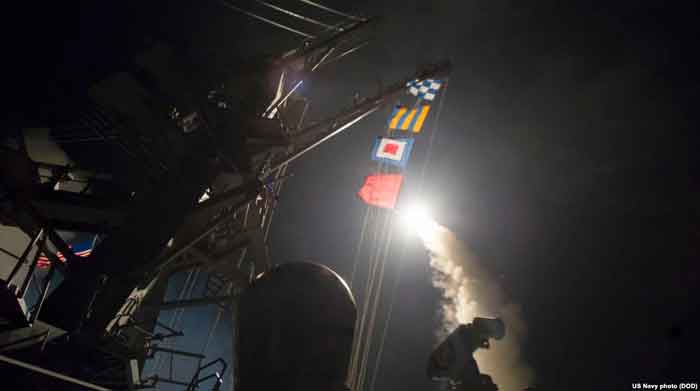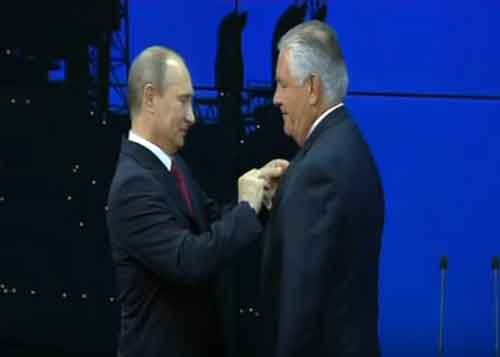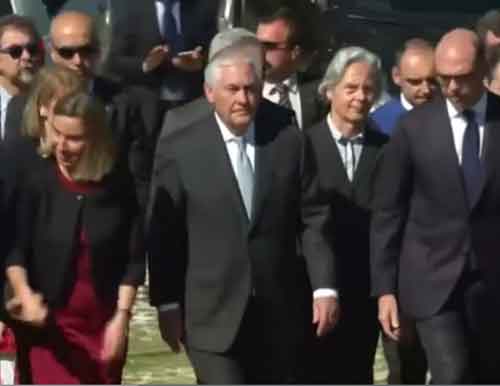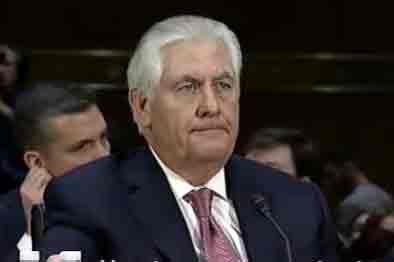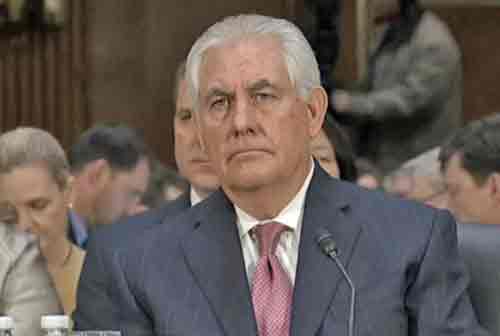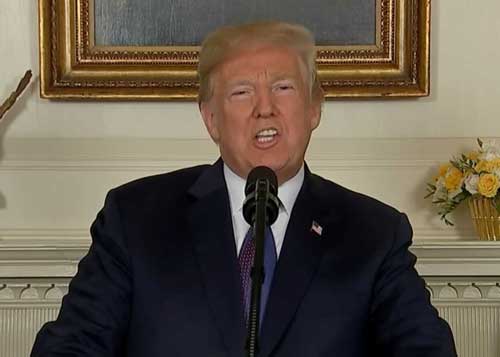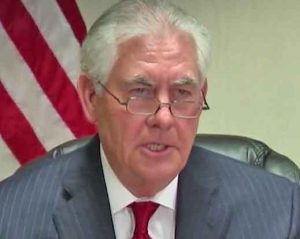
U.S. Secretary of State Rex Tillerson called for the ouster of Syrian President Bashar al-Assad on Thursday in the aftermath of the chemical-weapons attack this week that killed nearly 100 people in a rebel-held town and sickened another 350.
“The process by which Assad would leave is something that requires an international community effort, both to first defeat ISIS [Islamic State extremists] within Syria, to stabilize the Syrian country to avoid further civil war, and then to work collectively with our partners around the world through a political process that would lead to Assad leaving,” Tillerson told reporters in Florida.
Signaling an abrupt shift in U.S. policy about Assad’s future in Syria, Tillerson said there would be “no role for him to govern the Syrian people.”
Tillerson’s remarks contrasted with comments at the White House just last week, where spokesman Sean Spicer said President Donald Trump’s administration is moving away from the stance taken by former President Barack Obama, who had called for Assad’s removal.
“There is a political reality that we have to accept in terms of where we are right now,” Spicer said Friday. “We lost a lot of opportunity [during] the last administration, with respect to Assad.” Spicer said then, as Tillerson had, that Assad’s fate should be decided by “the Syrian people” — comments taken by the world as a signal that Washington no longer attached a top priority on dislodging Assad from power in Damascus.
Trump was in accord with Tillerson’s new position on Syria, as he arrived in Florida late Thursday for a summit with Chinese President Xi Jinping. The president said Assad is “running things” in Syria, and clearly in charge there, “so something should happen” in response to the chemical weapons attack.[xyz-ihs snippet=”adsense-body-ad”]A day earlier, Trump deplored the gas attack in Syria as “an affront to humanity that cannot be tolerated.” The attack killed untold numbers of children, sparking global moral outrage against Assad and Russia, Syria’s biggest ally.
“We are considering an appropriate response” to the chemical attack in Syria, Tillerson said, and the United States is consulting with other countries to determine how best to respond. “It’s a serious matter; it requires a serious response.”
U.S.: Assad ‘responsible’ for attack
The top U.S. diplomat said Tuesday’s attack “horrified all of us. … There is no doubt in our minds, and the information we have supports this, that Syria, the Syrian regime” under Assad, is “responsible for this attack. And, I think, further it is very important that the Russian government consider carefully their continued support for the Assad regime.”
The U.S. military said Syrian attack planes dropped the chemical bombs on a rebel-held town.
“People on the ground were observed reacting to a nerve agent, and the building hit was determined to be a hospital,” a U.S. military official told VOA.
The official said that Syrian fixed-wing aircraft carried out the attack, and rejected Russian and Syrian claims that the target hit was a rebel-controlled warehouse stockpiling chemical weapons.
Syrian Foreign Minister Walid Moallem said in Damascus his country did not use chemical weapons during airstrikes on Khan Sheikhoun, and insisted they would never be used, “even against terrorists.” He repeated Russia’s report that the airstrikes hit a warehouse, not a hospital.
The Kremlin said Russian President Vladimir Putin, in a phone call with Israeli Prime Minister Benjamin Netanyahu, “underlined that it’s unacceptable to make unfounded accusations against anyone until a thorough and unbiased international investigation” has been conducted. But a Putin spokesman also said that Russia’s support for Assad is not unconditional.
Turkish Justice Minister Bekir Bozdag said in Ankara that autopsy results on three Syrians killed in the attack show they died as a result of exposure to chemical weapons. The three were among at least 30 others who were sent to Turkey. Bozdag said the autopsies were conducted by officials from the World Health Organization late Wednesday in Adana.
Moallem demanded any investigation into the bombing not be politicized, stressing that it begin in Damascus, not Ankara.
Jordanian King Abdullah II, meeting with Trump at the White House on Wednesday, said, “This is another testament to the failure of international diplomacy to find solutions to this crisis.”
Britain, France and the United States strongly condemned Russia on Wednesday during an emergency session of the United Nations Security Council.
The fate of a draft U.N. resolution condemning the attack written by the three Western powers remains in limbo, as Russia’s envoy said at the emergency session he did not think the time was right for such action.
Expert analysis
When asked about the validity of Russia’s assertion that Syrian warplanes struck a facility housing chemical weapons possessed by rebel forces, American expert Craig Williams told VOA, “Anything is possible, though it strikes me as a bit far-fetched.”
Williams, an informal adviser to the Organization for the Prohibition of Chemical Weapons, a U.N. agency, says it is possible that sarin gas stored in a building and hit by an airstrike using conventional weapons could be released.
“That could be one scenario, but it is not the most likely,” he said. “If sarin was stored there and hit by a missile, it would most likely be consumed in the subsequent fireball, but if any sarin molecules escaped and weren’t consumed in the explosion, then they would disperse. There are too many variables to take into account, and I have no way of knowing from afar.
“I think the most likely cause is that an agent was dropped by regime warplanes,” he said.
VOA’s Margaret Besheer, Jeff Seldin, Jamie Dettmer, Peter Heinlein and Carla Babb contributed to this report.
Source: VOA [xyz-ihs snippet=”Adsense-responsive”]

